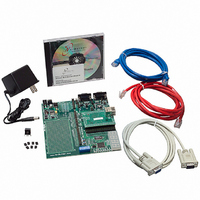NNDK-MOD5272-KIT NetBurner Inc, NNDK-MOD5272-KIT Datasheet - Page 304

NNDK-MOD5272-KIT
Manufacturer Part Number
NNDK-MOD5272-KIT
Description
KIT DEVELOP NETWORK FOR MOD5272
Manufacturer
NetBurner Inc
Series
ColdFire®r
Datasheets
1.MOD5272-100IR.pdf
(2 pages)
2.MOD5272-100IR.pdf
(550 pages)
3.NNDK-MOD5282-KIT.pdf
(2 pages)
Specifications of NNDK-MOD5272-KIT
Main Purpose
*
Embedded
*
Utilized Ic / Part
MOD5272
Primary Attributes
*
Secondary Attributes
*
Processor To Be Evaluated
MOD5272
Interface Type
RS-232, RS-485, USB
Lead Free Status / RoHS Status
Contains lead / RoHS non-compliant
Lead Free Status / RoHS Status
Lead free / RoHS Compliant, Contains lead / RoHS non-compliant
Other names
528-1001
- Current page: 304 of 550
- Download datasheet (6Mb)
GCI/IDL Block
D-channel receive register, that is, the first two D-channel bits from the first frame go into
the two msbs, B
and so on, until the last two D-channel bits in the fourth frame are aligned in B
13.2.3.5 GCI/IDL D-Channel Contention
Typically, when the CPU wants to transmit a D-channel packet, it starts the HDLC framer.
In IDL mode, when the CPU can start sending data from the prepared HDLC frame to the
D-channel transmit register, it asserts DREQ by setting the appropriate DRQ bit in the
PDRQR register. The D-channel controller hardware looks for a valid DGRANT back from
the layer 1 transceiver and, assuming DREQ is also valid, begins transmitting the
D-channel packet. PDCSR[DGn] reflects the value of the dedicated DGRANT pin. Refer
to the MC145574 data sheet for SCIT mode information.
In GCI mode the only D-channel contention control is provided by PnCR[G/S],
Section 13.5.7, “Port Configuration Registers (P0CR–P3CR).” Provided the PLIC operates
in SCIT mode, PDCSR[DGn], Section 13.5.19, “D-Channel Status Register (PDCSR),” is
defined by the state of PnCR[G/S], and is used to control D-channel transmission along
with PDRQR[DRQn], Section 13.5.20, “D-Channel Request Register (PDRQR).” In GCI
mode, the PLIC ports do not support any other form of D-channel contention such as the
indirect mode found on the Motorola MC145574. In GCI mode, the DGRANT pin function
found in IDL mode is disabled and the pin can be defined for other functions. Please note
that the D-channel periodic interrupts in both the receive and transmit direction are not
disabled even though the shift register is disabled by DREQ, DGRANT, and
PDRQR[DCNTIn]
configuration.
An override mechanism for D-channel contention control is provided through the
D-channel ignore DCNTI bit.
Figure 13-8 illustrates this functionality:
13.2.4 GCI/IDL Looping Modes
The PLIC ports can be configured to operate in various looping modes as shown in
Figure 13-9. These modes are useful for local and remote system diagnostic functions.
13-8
7
and B
(Section 13.5.20,
6
, the next two D-channel bits from the second frame in B
Figure 13-8. D-Channel Contention
MCF5272 User’s Manual
Shift Register Enable
“D-Channel
Request
Register
DGRANT
DREQ
DCNTI
(PDRQR)”)
1
MOTOROLA
and B
5
and B
0
.
4
,
Related parts for NNDK-MOD5272-KIT
Image
Part Number
Description
Manufacturer
Datasheet
Request
R

Part Number:
Description:
BOARD SERIAL-ETHERNET 512K FLASH
Manufacturer:
NetBurner Inc
Datasheet:

Part Number:
Description:
PROCESSOR MODULE FLASH MOD5272
Manufacturer:
NetBurner Inc
Datasheet:

Part Number:
Description:
PROCESSOR MODULE 512KB FLASH
Manufacturer:
NetBurner Inc
Datasheet:

Part Number:
Description:
DUAL PORT SERIAL-ETHERNET
Manufacturer:
NetBurner Inc
Datasheet:

Part Number:
Description:
PROCESSOR MODULE FLASH
Manufacturer:
NetBurner Inc
Datasheet:

Part Number:
Description:
PROCESSOR MODULE 512KB FLASH
Manufacturer:
NetBurner Inc
Datasheet:

Part Number:
Description:
MOD5234 10/100 ETHERNET MODULE
Manufacturer:
NetBurner Inc
Datasheet:

Part Number:
Description:
KIT DEVELOP NETWORK FOR MOD5282
Manufacturer:
NetBurner Inc
Datasheet:

Part Number:
Description:
DUAL PORT SERIAL-ETHERNET
Manufacturer:
NetBurner Inc
Datasheet:

Part Number:
Description:
Ethernet Modules & Development Tools 32 Bit 66MHz 40 Pin DIP Industrial Temp
Manufacturer:
NetBurner Inc
Datasheet:

Part Number:
Description:
Ethernet Modules & Development Tools MOD5213 DEVELOPMENT KIT
Manufacturer:
NetBurner Inc

Part Number:
Description:
Ethernet Modules & Development Tools DUAL PORT SERIAL EHTERNET DEVICE
Manufacturer:
NetBurner Inc
Datasheet:

Part Number:
Description:
Ethernet ICs 32bit 147MHz CAN-to- Ethnt Device IndTemp
Manufacturer:
NetBurner Inc
Datasheet:










